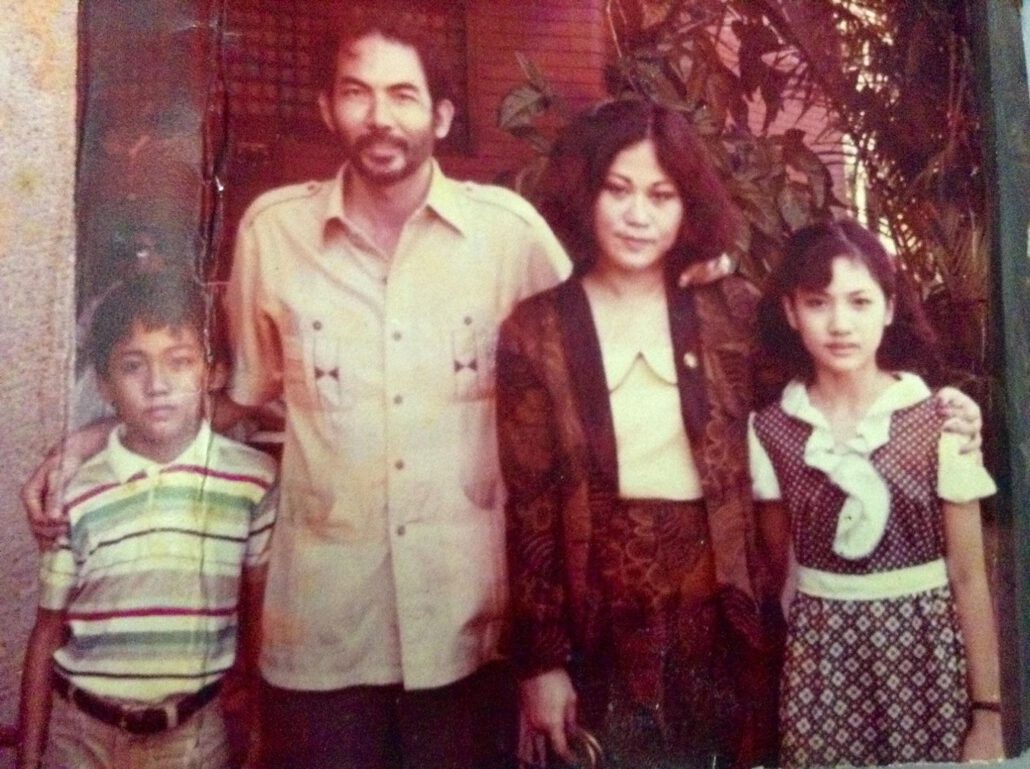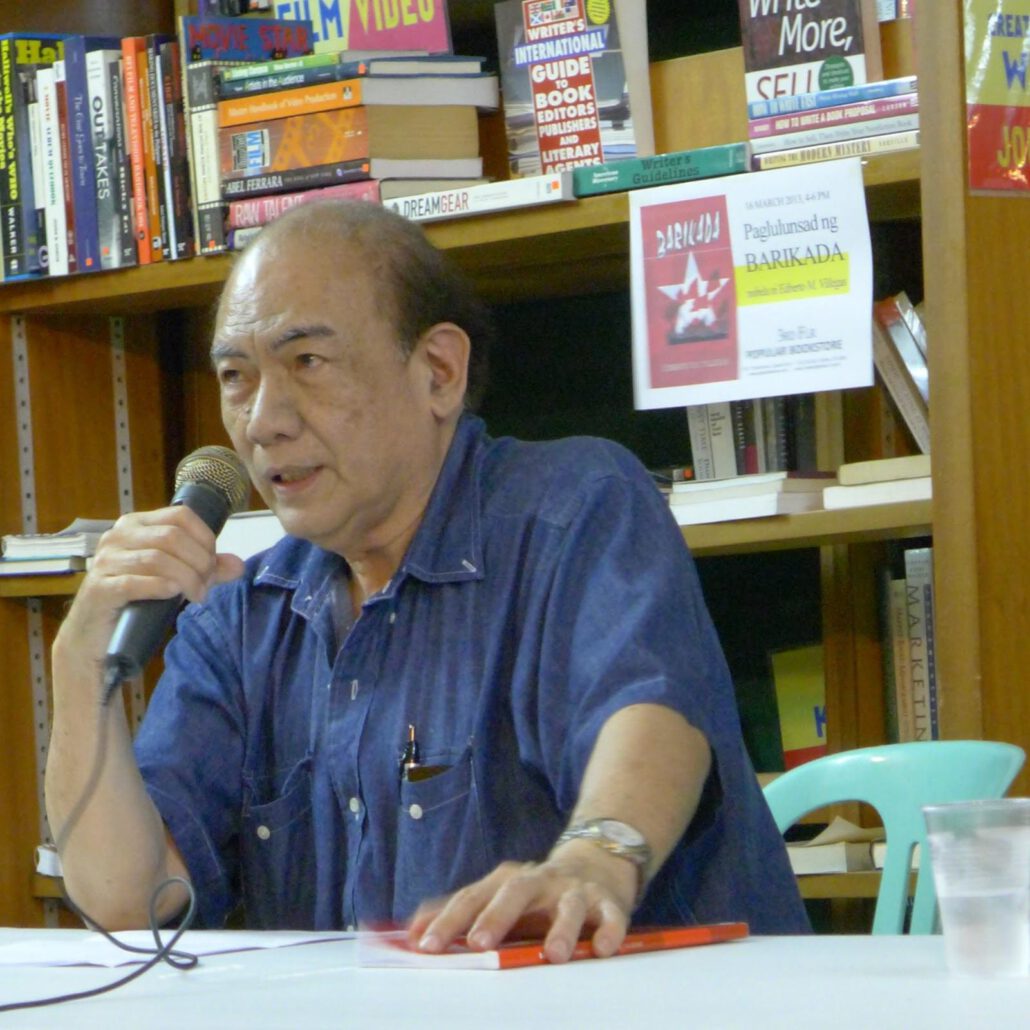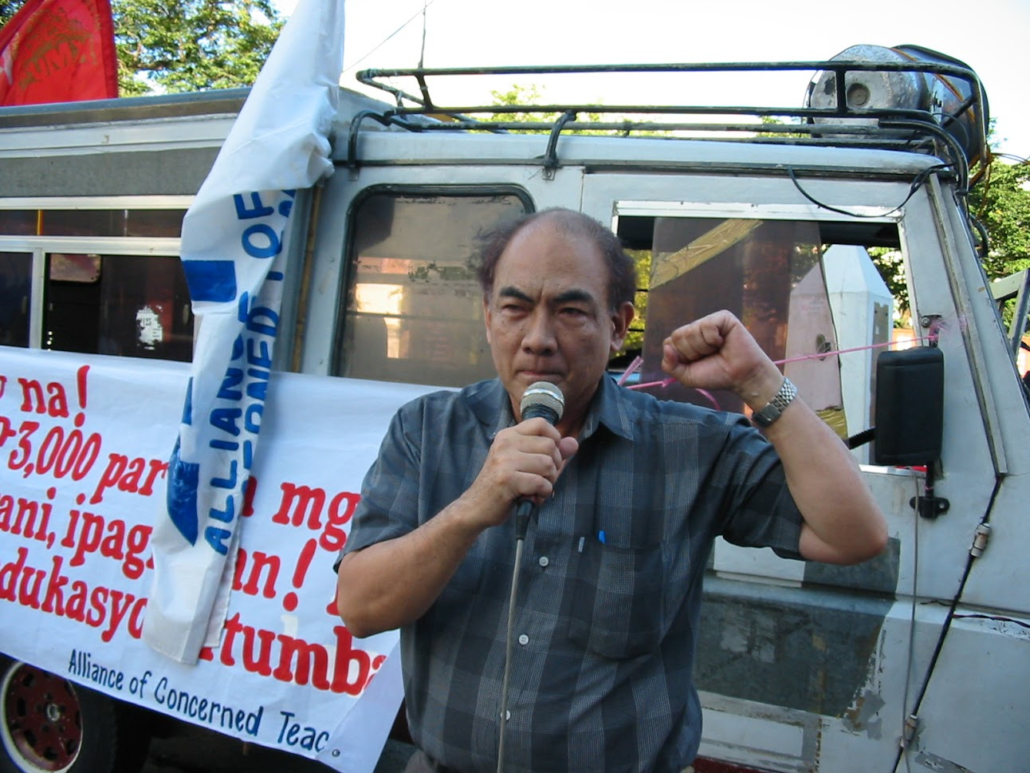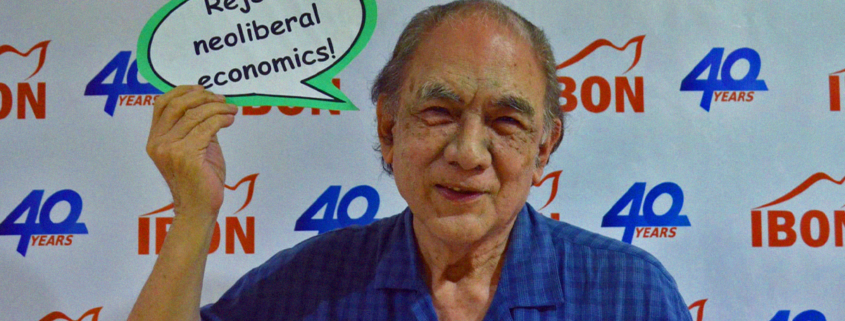Tatak EdVil
By Raymund B. Villanueva
Edberto Malvar Villegas’ death last Monday sparked many recollections by colleagues and admirers of his legend. He was not an activist mass leader remembered long after his heyday nor was he a revolutionary who took up arms and died in a glorious battlefield. He is fondly remembered for achievements and contributions to national liberation that are as expansive as they are profound. And he achieved them all in his unique way. Tatak EdVil.
Most anyone who knew and listened to Ed/Doc Ed/EdVil would agree he was unabashed about being one of Miguel Malvar’s grandchild. There is no descendant of the illustrious patriot more determined than Ed in telling the late general’s fight with United States (US) imperialism as well as correcting falsehoods about him. He even debated with those who benefited from the largesse given by the US from among the Malvar clan so much that he was asked to no longer talk about their forefather during family reunions. Being who Ed was, he, of course, declined and carried on.
His relatives would probably agree it was Ed who carried on with the general’s patriotic fervor the most. While his siblings and the rest of the clan carved out names and careers in accordance with their lofty social and economic status, it was Ed who consciously sought to continue their grandfather’s unfinished war for genuine Philippine liberation.
Here is an attempt to tell Ed’s story.
‘Good-looking scholar’
Ed was mestizo and was said to be mucho guapito in his younger years, probably benefiting from his mother Dona Chabeng’s legendary beauty. It was his peace talks colleague Atty. Edre Olalia who acknowledged after Ed’s death. “I always wondered how you really were when they said you were a looker during your heyday,” Olalia wrote.

Ed himself said he had many girlfriends in his high school days at De La Salle University. “We did not date girls from nearby St. Scholastica’s College so much then. We preferred going over to Makati to woo Assumptionistas,” he said.
But the youngster who fought with his brothers Joselito and Bernardo over who got to drive their family car to go on dates became a serious student in college. He took up English and Journalism at the University of the Philippines (UP), becoming a college scholar in his sophomore year. In his junior year in 1961, he topped the comprehensive examinations for English and Journalism majors. He graduated in 1962 at the top 10% of UP graduates of the year, thus becoming a Phi Kappa Pi International Honor Society member. He also became a member of the illustrious Phi Gamma Mu International Honor Society for the social sciences.
Ed’s generation started the social movements that still influences and defines Philippine society to this day. Its best and brightest gravitated with each other and Ed found himself in the company of fellow scholars Jose Maria Sison, Monico Atienza, Fidel Agcaoili and others who formed the Student Cultural Association of the U.P. (SCAUP) in the early 1960s. “We fought for academic freedom and the right to write and publish articles advocating national and social liberation from foreign and feudal domination. [I]n the spirit of fighting for greater freedom and a better future of the Filipino people, we were together with Ed in envisioning the national democratic and socialist stages of the Philippine revolution. For the purpose, we in the SCAUP engaged in the study of Philippine revolutionary history and the current social circumstances as well as the application of Marxism-Leninism in the successful revolutionary experiences of the proletariat and people abroad,” Sison recalled of their days at UP.
When the group decided to form the Kabataang Makabayan (KM), Ed was among its founding members. Sison said they once had a pre-founding caucus at the Villegas’ house along Singalong Street in Manila. “Ed became a charter member of KM when it was founded in 1964. He contributed greatly to political education and mass work among students in several universities, among young teachers and professionals, among young workers in trade unions belonging to Lapiang Manggagawa (later named Socialist Party of the Philippines) and mostly children of peasant members of MASAKA, then under the leadership of Felixberto Olalia,” Sison said in his tribute to Ed.
From 1967 to 1969, Ed was president of the UP Philosophical Society. Being the scholar that he was, Ed was asked by the then newly-founded Communist Party of the Philippines (CPP) to continue teaching in universities.

Heavily tortured
Sison said Ed would have readily agreed had they asked him to join them upon the establishment of the New People’s Army (NPA) in 1969. “But we thought that he could accomplish more for the national democratic movement by educating and inspiring the youth in the university. By then, Ed had become highly respected as an excellent educator by doing research, writing books and teaching. After earning his Master of Arts degree in philosophy at UP in Diliman in 1970, he became the chairperson of the Division of the Humanities of UP College, Baguio and was responsible for holding the first ever First Summer Writers’ Workshop in 1971.
“Paradoxically, despite his non-involvement in the armed struggle, he went to prison ahead of us in 1976 on mere suspicion of giving shelter to NPA commanders. He was subjected to intense physical and psychological torture along with his late wife Lilia. He was detained for two years by the Marcos fascist dictatorship,” Sison wrote.
Fellow martial law political detainee Hermie Garcia recalled that Ed was known in Camp Bagong Diwa in Taguig, Rizal as the bearded nerd always discussing ideological theories. “There was this joke that if you had some urgent thing to do, do not get near Ed because he won’t let you go before listening to his brilliant ideas. But Ed, with the nerd look and serious interest in ideas, had a soft heart for detainees, especially those who came from poor families. He would be seen talking to them for hours and listening to their stories. That was the Ed Villegas I knew,” Garcia said.
To heal himself from the effects of intense physical and psychological torture (he was made to listen to the screams of Lilia being tortured in the next room) Ed learned yoga and meditation in prison. Decades later, during long study sessions and meetings, Ed would be in a lotus position for hours and do headstands even when he had grown fat and heavy.

Great academic and teacher
After his release from prison, Ed transferred to UP’s Manila campus where he became chairperson of the Development Studies Program of its Department of Social Sciences for 22 years (1983- 2005). He initiated three revisions and improvements of the Development Studies curriculum that molded hundreds of scholars to become development workers. After earning his Doctorate in Public Administration from UP Diliman in 1987 as a university scholar, Ed became chairperson of the Department of the Social Sciences from 1988 to 1994. A true innovator, he also initiated the annual holding of the Social Science Week in 1989 that today still features forums, competitions, exhibits, and concerts to arouse consciousness in the Social Sciences, which particular emphasis on the Philippine situation. In 1996, Ed was named the Dr. Antonio Sison Professorial Chair of the UP System for research on the history of the International Monetary Fund in the Philippines.
As a teacher, Ed influenced thousands of his students through theory and practice. Now an academic herself, Neen Sapalo said it was her Professor Villegas who thought her valuable concepts like political economy, wage, semi-feudal mode of production, and the surplus theory of profit-labor-value. “He asked us to read Karl Marx’s Das Kapital and made us compute how workers are systematically exploited using a case study of Cola-Cola employees. He told us it is important to master them not to graduate with Latin honors but to be able to contribute whenever we meet workers and farmers. Praxis, always,” she recalled.
Agrarian reform advocate Amihan Euza Mabalay said Ed was such a compelling teacher he changed her life and perspectives about society and the world. “He was fearless and always passionate. Often, when there were forums at (UP Manila’s) Rizal Hall and there were raised voices in righteous anger, it was Doc Ed for sure,” Mabalay said. “As his student, I admired how Doc Ed was able to put into praxis his academic theories and radical activism. He understood the theories and exposed fallacies of neoliberal economics and his development approaches were rooted in the people’s struggles. It was an honor to have known him and be his student inside and outside the halls of UP Manila,” she added.
Ed also taught at De La Salle University, tutoring students who later became top government technocrats and politicians.
Ed’s way of ending an illustrious teaching career
UP Manila’s information sheet on Ed as a teacher showed an exemplary teacher, beloved by students. He was consistently rated “very satisfactory” by his Development Studies students. Ed retired from UP when he reached the mandatory retirement age of 65 in 2005. As a pillar of UP Manila’s College of Social Sciences, he was retained as professorial lecturer in 2006.
But his radicalism was too much for university administrators who took the very first opportunity presented them to get rid of one the university’s best teachers ever. When Kristel Tejada (a student who forcibly left school in 2013 for her inability to pay fees) committed suicide, Ed could not contain his outrage and openly denounced UP Manila’s administration. After a lightning rally by KM members, Ed conducted his own strike against the then chancellor and vice chancellor who advised poor students like Tejada to file leaves of absences if they could afford studying at the state university.
“I will never forget what Doc Ed did. He stood in front of the university theater and everyone heard what he had to say. The next school year, his contract was no longer renewed. The Development Studies program was stunned, as Doc Ed was the catalyst even among non-activist faculty. He was a great loss to the program,” Sapalo said.

Indeed, very few would risk a long and illustrious teaching career just to call for justice for a student. Ed did and walked his talk, proving he was both theory and practice.
Ed’s teaching skills were not confined to UP and La Salle classrooms, however. He relished being invited to informal classes, teaching thousands of budding activists.
“Ed Villegas was one of our favorites when we were still young activists in UP. He and Elmer Ordonez provided us with the theoretical framework for opposing the commercialization of UP. We enjoyed his lectures and how he would crush the neoliberal dogma of liberalization, privatization and deregulation,” Bagong Alyansang Makabayan (Bayan) secretary general Renato Reyes Jr. wrote. “He was always funny in our interactions. Hilarious was more like it. He was not our classroom teacher but our generation learned so much from him. He was endearingly called ‘Mad Marx’, a spin on the 80’s movie Mad Max, because of his gung-ho attitude in lectures and debates. He was a true patriot and he will be greatly missed,” Reyes added. Reyes was the last but definitely not the only Bayan secretary general Ed mentored.
Defend Jobs Philippines spokesperson Thaddeus Ifurung said Ed was also the favorite lecturer among Polytechnic University of the Philippines (PUP) activists in the early 1990s. “He was among those who sharply and profoundly explained political economy and class analysis to us. He was a favorite and a mainstay in our educational discussions,” Ifurung said.
“We always invited him to discuss political economy and other serious topics he explained with ease and lots of humor,” University of the East-Manila alumnus and PUP Professor Prestoline Suyat added.
Extra-curricular functions
Ed’s numerous activities also went beyond teaching. On top of his teaching and administrative duties at UP Manila, he became vice-president of Pamantasang Assembleya from 1990 to 1993 that ensured the university’s relevance with local and national issues of the day. He was also UP Academic Employees Union vice-president from 2000 to 2005.

From 1996 to 2001, Ed served as secretary general of the Alliance of Concerned Teachers (ACT), playing a vital role in reviving what was then a moribund national teachers’ movement. Ed remained an active member of ACT, which is now joined by other teachers’ formations such as the Congress of Teachers-Educators for Nationalism and Democracy, ACT Teachers’ Party, ACT Unions, and ACT Private Schools. He was among the 50 recipients of ACT’s Guro ng Bayan Award in September 2013 honoring the stalwarts of the teachers’ movement in the Philippines.
Ed was also a convenor of Anakpawis and Bayan Muna parties. In addition, he was a founding member of the National Advocates for Land Reform in 1995; founding member of CREATE, a research group on workers’ issues, in 1995; chairperson of the Ecumenical Institute for Labor Education and Research from 1994 to 1996; chairperson of the Marine Education and Research Center, an organization servicing overseas Filipino seamen, from 1989 to 1994; chairperson of the Center for Applied Research and Library Services, an organization servicing the Filipino working class, from 1985 to 2000; and a founding member of the Nationalist Alliance in 1984. He also led the Philippine Anti-Imperialist Studies and served as board president of the Crispin B. Beltran Resource Center.
At the time of his death, Ed was a board member of IBON Foundation and IBON International that he also served as chairperson and vice-chairperson at various times during his long involvement with the research group.
Former IBON Foundation executive director and current head of research Rosabella Guzman said he is proud and grateful for having Ed as teacher. “If you taught sports, I would have learned extreme sports from you. I am grateful when we worked together. Thank you for being a mainstay IBON board member,” Guzman wrote. She added Ed was even good at judging the staff’s cultural presentations and parlor games, complete with clear criteria, during Christmas parties.
Prodigious writer
Ed wrote many books on political economy, several of which became bestsellers and required reading for activists. As a recognized Marxist political economist, he wrote Studies in Philippine Political Economy; Global Finance Capital and the Philippine Financial System; Political Economy of Philippine Labor Laws; Japanese Capital and Investments in Southeast Asia; A Guide to Karl Marx’s Das Kapital; Oil Imperialism in the Philippines; Japanese Capitalism and the Asian Development Bank; Global Finance Capital and the Philippine Financial System, as well as many pamphlets, monograms and essays.
“Back in college myself, [Ed’s] studies on the commodification of higher education was a great lesson on demystification and humility, resulting in a desire on my part to cultivate more serious understanding of national democratic and socialist alternatives,” UP Professor Sarah Raymundo wrote.
“As a member of the Philippine Anti-Imperialist Studies, [Ed] wrote popular material on the history of the Katipunan-led revolutionary struggle against Spanish colonialism and the ensuring armed struggle against US imperialism, focusing on the lives of Andres Bonifacio, Emilio Jacinto, and his own grandfather, General Miguel Malvar,” Sison, himself the author of many books, added.
IBON said Ed wrote tirelessly. “His writings were not just technically razor-sharp but always fiery with anger at exploiters and oppressors, while full of optimism that a more humane world was being built and coming eventually,” IBON said.
For his outstanding scholarship, Ed is included in the International List of Google Scholars and his books are archived at the Washington Library of Congress.
Aside from poetry, Ed also wrote two novels, Sebyo and Barikada. Describing the books, Sison said the first novel, which Ed wrote using the pseudonym Carlos Humberto, depicted the activists mainly in the early period of the national democratic movement the 1960s. The second depicted various characters in the later development of the movement in the post-Marcos period. “In both novels, the positive characters talk like activists who have studied Marxism, the people’s democratic revolution and socialism,” Sison wrote. “The third book comprises of short stories about people from the lower depths of society. His collection of 12 short stories, Mga Kuwento Mula sa Lipunan (Stories from Society), was published in 2016,” Sison added. Ed’s literary chops made him the chairperson of the Amado V. Hernandez Resource Center, an organization promoting the literary capabilities of the working class, from 1989 onward.

Peace warrior
One of Ed’s activities well-known to many was his role as National Democratic Front of the Philippines (NDFP) Negotiating Panel resource person.
As an instrumental member of the NDFP Reciprocal Working Committee on Social and Economic Reforms from its formation in 1994 up to his death, Ed attended formal negotiations with the Government of the Republic of the Philippines (GRP), negotiating with former students like Hernani Braganza. “As a political economist truly knowledgeable about the socioeconomic and political conditions of the Filipino people, Ed made highly significant contributions to the formulation of the NDFP Draft of the Comprehensive Agreement of Social and Economic Reforms,” Sison wrote. “In the many consultations and internal discussions on the aforesaid draft, he stood for genuine land reform and national industrialization as the way to the economic and social development of the Philippines. At the same time, he was among the most persistent in reminding others on ensuring that the interests of the toiling masses of workers and peasants be given the highest priority and that the dangers of imperialist machinations be blocked,” Sison added.
How Ed championed free land distribution to poor farmers, it would be easy to forget he was of the landed class. His family once owned the vast UP Los Banos campus and surrounding properties until it was appropriated by the government. The Malvars also own land in Batangas.
IBON said Ed’s penetrating views on social and economic issues found ready outlet in his enthusiastic work in the NDFP-GRP peace process. “Much like his grandfather on the Pact of Biak-na-Bato truce between Spain and Filipino revolutionaries in 1897, he was keen that any peace deal should properly address the needs and aspirations of the Filipino people,” the group added.
IBON’s current executive director and peace talks colleague Jose Enrique Africa said Ed was always the most radical in the room and used all [his] energy to make sure that everyone in the NDFP team looked as far ahead as him. “Political economy was never as hilarious — and won’t be the same without [Ed],” he said.
Olalia added Ed always managed to emphatically make his profound and uncompromising points during peace consultations like a passionate and driven professor he was. There were even stories that Ed was sometimes “unleashed” by the NDFP to deliver his lengthy lectures on workers and peasant rights whenever the GRP was being very obtuse on important points in the negotiations.
“Given the chance to speak, Ed was known for his expansive explanations, historical sweep, and irreverent asides. There was always much color and energy – even if, often, listeners were left perplexed and unable to follow his elaborate thoughts and machine-gun delivery of ideas. And those gestures! He wasn’t just verbally explosive but also gestured dangerously and frantically,” IBON said.
Indeed, Ed did not vary much from the Camp Bagong Diwa political prisoner Garcia remembers.

Fiery and funny
But the “Mad Marx” is not beyond having silly moments or finding himself in hilarious situations. Olalia recalled a time when he, Ed and another peace talks colleague were left waiting in a cold and quiet room at an embassy waiting for their visa application to be processed. “We had such a great laugh killing time and muffling our guffaws…[He was] giggling like a child when we were having silly word plays that it became a LSS even after we stepped out hours later,” Olalia wrote. He also recalled an oft-told scene after a round of formal peace talks in The Netherlands when Ed “gave a barge long anchored [at a lake] the finger, motioned to strafe it with a ‘rat-a-tat-tat-tat’ sound [and] with machine gun fingers, with a matching flying kick to boot because Fidel Agcaoili and Randall Echanis (both recently departed) joked that it was probably a listening post of the US Central Intelligence Agency (CIA) or the Dutch intelligence.”
Olalia also recalled Ed had to frantically search for an NDFP consultant at the Sistine Chapel (inside Vatican City) because their passports were switched and Ed could not check in at the airport on his flight out. “But [Ed] instantly concluded with absolute certainty that it was the CIA that was behind the mix-up,” Olalia wrote. “[He was] another eloquent proof that being firm, grim and determined does not mean one cannot be wacky and witty,” Olalia added.
Teachers rights advocate Laramei Austria remembered Ed to be quite the raconteur. When he found out that they were Sto. Tomas, Batangas townmates, Ed always regaled her with stories of the many events held at the Malvar mansion. It turned out that Austria used to play angel in several of Dona Chabeng’s Flores de Mayo while her own grandmother and mother helped in the cooking when there were parties and other grand events at the old house.
“Since then, whenever we see each other, he never failed to ask if I have had the chance to visit the old town,” she said. And when he stood as sponsor at her wedding, Ed “gave the longest speech at the reception, of course.”
“Ed is immortal because of the great educational and political service that he rendered to the Filipino youth and people,” Sison and wife Julietta de Lima wrote in their official tribute. “His revolutionary ideas and deeds will continue to inspire the people in their revolutionary struggle for national liberation, democracy and socialism. The historical record, the testimonies of his comrades, his own written works and most importantly the continuance and victorious advance of the Philippine revolution will ensure his immortality from one generation to another,” they added.
“Indeed, what Ed wrote on his post, two weeks before charging into the night, was brightly appropriate for our irrepressible and larger-than-life Mad Marx: ‘Long live the continuing struggle of the Filipino people for social justice, democracy and national sovereignty!’” IBON said.
The CPP summed Ed nicely in its tribute to its founding and lifelong member: “With Dr. Villegas’ passing, the Filipino people lost one of the country’s most fervent patriots, champion of anti-imperialism and revolutionary intellectual.” #

